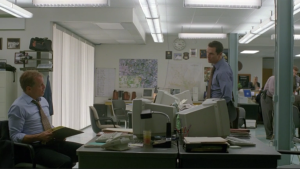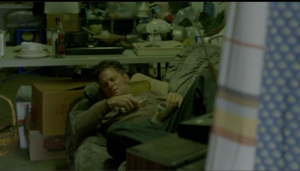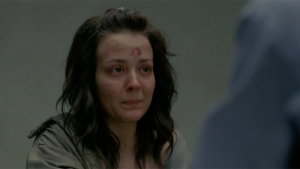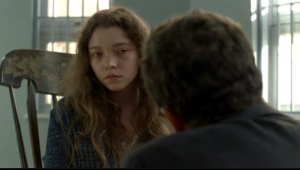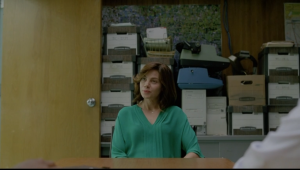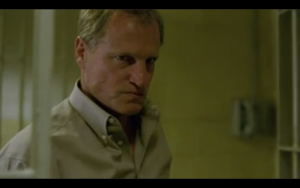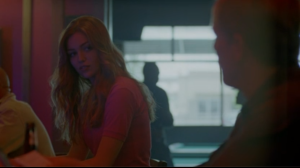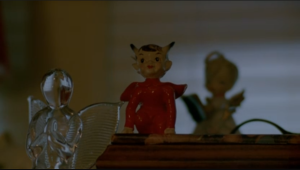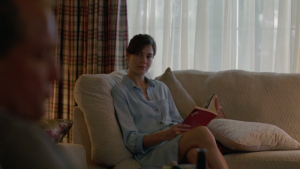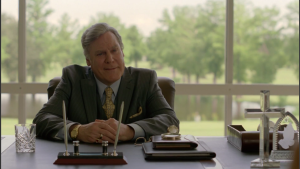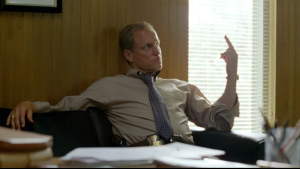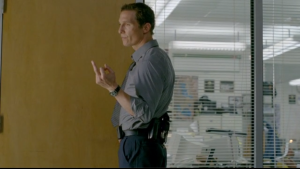“Haunted Houses”
2002
“Haunted Houses” opens with Marty finishing his unfinished business with Audrey from Episode Five—that is, beating up the older boys arrested with her. The guarding officer takes his leave, while the boys beg and plead for mercy, only for Marty to don black gloves and pulverize both boys—then vomit afterwards. Meanwhile, Rust continues his isolated investigation into the Tuttle Schools—interviewing another parent whose child was enrolled in a school funded by the Tuttle Wellspring program who then disappeared.
Later, amidst shopping errands at a mall, Marty looks into buying a new phone and having an afternoon beer. While at the bar, a clerk from the cell phone stores introduces herself as Beth—the same Beth that the detectives encountered at the Ranch for runaway prostitutes of which Dora Lange formerly belonged in ’95. She praises Marty for being a hero, and the two end up having sex in her apartment later that night.
Rust, however, remains focused on the case as always. He tracks down Joel Thierot—the minister from the traveling Church encountered in “The Locked Room”—and questions the now drunken and disbanded minister about his dealings with Tuttle. The former religious man feigns bureaucratic issues at first, only to crumble under Rust’s questioning. He confesses that after questioning the administration with incriminating photos of underage children found hidden within a book that he knew that his days working for Tuttle administration were over.
Back a the office, Rust is in the midst of drawing out a confession from a woman who unplugged her baby from a breathing machine. Rust also makes special note of the fact that her previous two children had also died of “SIDS”. After receiving her confession, Rust offers her the “advice” that: “The newspapers…they’re gonna be tough on you…and prison is very, very hard on prisoners who hurt kids…if you get the opportunity you should kill yourself”.
A bit later, Rust demands Marty type up the report of the incident—citing the latter to finally confront Rust for his abnormally strange behavior of late (even by Rust standards). Rust becomes particularly aggressive, citing his successes and any of Marty’s due to him, causing a clear rift to begin to emerge between the two partners. Nonetheless, Rust questions Kelly—the girl he rescued from the Reggie LeDoux Compound—where she reluctantly reveals the presence of a third man: The Man With the Scars. The memory of his presence causes her eruption into an uncontrollable anxiety attack that incites Rust to leave and the doctors to sedate her.
At the office, Rust explains to the new Major—Leroy (played by Spiros Vondas himself, Paul Ben-Victor)—about his theory of more missing children connected with the Tuttle Wellspring program—only to be dismissed by both the Major and Marty. Despite a warning not to pursue this, Rust interview Billy Lee Tuttle himself. Under the guise of investigating tax records, he asks Tuttle about tracking down any files, personnel, or faculty—to which the Reverend blames a flood or dodges his way around questions. Unsurprisingly, the Major quickly learns of Rust’s clandestine interview and suspends him without pay.
Back in the Hart residence, Maggie suspects that Marty is still cheating on her while doing his laundry and checks his phone to find a number of nude texts from Beth. Hoping to turn the tables on him, she goes to a bar to pick up a date—only to find herself unable to follow through. Still, after, she meets Rust at his lonely apartment and speaks about her troubles with Marty. Seconds later, the two are making love—when immediately after, Rust screams at her to get “the fuck out”. Maggie later tells Marty about her stand with Rust, flying Marty into a typical volatile rage.
The next day, Rust returns to the office for his files but Marty quickly attacks him in the parking lot. The two engage in an all-out brawl with the equal damage to both sides. In the Major’s office later, the two remain quiet about the source of the fight—prompting Rust to quit the job but not before complimenting Marty on his “nice hook”.
2012
The 2012 events are most interesting for their introduction to present day Maggie—remarried and more confident than ever. Perceptive to the detective’s prodding of her, Rust, and Marty, she offers answers that toe the line between truth and lying by omission—but enough to apparently satisfying Papania and Gilbough.
Marty, meanwhile, grows increasingly annoyed by the detective’s questioning of him, Rust, the implication of Tuttle’s overdose after Rust’s return, and the split between the two former partners. Marty finally decides that he has had enough and leaves the room—telling the detectives that if they call again he will not help. Driving back home, Marty realizes that Rust is the one repeatedly honking for him to pull over. He reluctantly does so, and after a decade long gap between the two, agrees to meet Rust for a beer.
———————————————————————————————————————————
REVIEW
Now firmly moving toward its final endgame, “Haunted Houses” is the first episode to set the stage for the series’ finale. With Rust’s interviews now over, present-day Maggie is brought forward to replace him—offering few actual answers but providing further support for the series overarching themes of false narratives. Moreover, the episode works to fill in the gaps for several major narrative elements—finally revealing the (somewhat predictable) cause for the split between the two detectives and further solidifying Rust’s strong suspicions toward Tuttle and his connection with the missing kids, Dora Lange, and the Yellow King.
The episode opens with Marty in quite disturbing fashion, as, yet again; he uses his police powers to fulfill personal impulses of exacting revenge on the boys caught with Audrey. Marty’s quote, as well, in justifying his behavior to the boys in saying: “a man’s game charges a man’s price…take that way from this if nothing else” only underscores the bizarre code of masculinity that composes so much of his sense of identity. This idea is further highlighted during Marty’s shopping expedition, when after purchasing and walking around with a bag of tampons, he feels the attraction of the nearby bar—an area that may help reaffirm his sense of masculinity.
Moreover, he succumbs to seduction from Beth after her inflating his ego with a barrage of compliments and flirtatious remarks that leads to their having sex. This act helps bring to mind Rust’s remark from their initial meeting with Beth at the ranch in Episode Two, where after Marty handed Beth a sum of money to do something else with her life, Rust commented: “Is that a down payment?” Though Marty rebuked his partner’s remark as “shitting on anything decent”, he has come to fulfill the remark nearly seven years later. It’s also interesting to note that Fukunagu repeatedly trains the camera on the angel/devil figurines with her bedroom—the latter bearing horns that call to mind the antlers imposed on Dora Lange and the former posed with hands bound in prayer that further echo the image of Dora’s death.
Most importantly, this episode finally brings about the climax for the most prominent relationships in Marty’s personal and professional life—the dissolution of both his marriage and his partnership with Rust. As Maggie astutely notes in her interview with Papania and Gilbough, “Rust knew exactly who he was and there was no talking him out of it…Marty’s single big problem was that he never really knew himself, so he never really knew what to want”. Marty’s conflict over his view of himself as a good man finally comes to a head within this statement. As Maggie has repeatedly told him that he used to be a good man, after his murdering Ledoux, after holding affairs and thinking that he may have failed as a father with his daughter Audrey, when Beth feeds him lines like: “You’re a good man, anybody can see that. I saw it the first time I met you. God gave us these flaws, that’s something I learned…he doesn’t see them as flaws, it’s how he made us, the universe forgives all”—his mistress helps further solidify Marty’s self-delusions of his identity that are broken by the end of the episode.
And after Maggie scrolls through his phone to find texts of Beth, she sits beside him in the living room—only to find Marty being his same old self. He goads his daughter, Audrey, and when she flees the room in a huff—he’s more interested in the game than confronting his daughter’s emotions. Exactly like in ’95. When rather than addressing his daughter’s disturbing drawings, Marty would keep his eyes on the TV—rather than on his daughter just below him—the detective’s curse mentioned previously. When Maggie finally confesses about her affair with Rust, his first reaction is—of course—to threaten her with violence, which she counteracts by urging him to do so: literally pushing her throat into his hands. When Marty fails to follow through with the act, Maggie calls him a “coward”.
Nonetheless, he carries this rage over to Rust the following day, where he engages in a full-blown boxing match with his former partner. There’s an elliptical sense of structure to ending on this after the opening of him beating up the boys in the opening—boys who engaged with another of Marty’s family members in illicit sexual activity. Though Rust almost appears to be dodging Marty’s blows and letting him have it out, the former finally slams Marty’s head into the taillight to stop the fight—breaking Marty’s self-delusion of physical power that the opening fight with the boys may have instilled.
Despite their torrid past, Marty feels reluctant to believe that Rust may be the killer responsible in the present. Juxtaposed with Maggie’s interview, this episode serves as almost a companion piece to the idea of Marty (and now Maggie) presenting falsified versions of the stories of their past while the viewer watches the “real” version play out in ’02. For despite their individual histories and problems with Rust, both seem to demonstrate a sense of complicity in Rust’s quitting the job—though neither seems willing to acknowledge that he may responsible for any crimes.
Meanwhile, Rust’s own drive to solve the crimes by looking into pieces from the past helps confirm his suspicions about the Tuttle organization’s involvement. When first meeting with the bereaved father, then former minister Joel Thierot—Rust hardly needs any more credence to his theory regarding the Wellspring program. * Like he’s able to do with so many suspects, Rust is able to draw out a confession for the minister’s real reason for leaving the organization after finding incriminating evidence damning Tuttle only for the matter to be handled “internally”.
*(At this point, it’s also worth noting that the exterior of the Tuttle office is completely surrounded by children and his wearing a Yellow Tie sends an all-too symbolic signal. Also, Tuttle’s remark regarding Thierot that: “It’s hard to trust a man who can’t trust himself with a beer…don’t you think?” has an especially ironic tinge to it knowing that Tuttle will later die of a supposed drug overdose.)
Moreover, we’re offered a more abrasive and confrontational Rust than ever before—a Rust who has reached his breaking point with Marty, with the bureaucracy of the police institution, and with the hypocrisy of the religious institution. His meeting with both the woman who killed her daughter and blamed SIDS, then with his meeting the still horribly traumatized Kelly from the Ledoux Compound—all seem to incite that fire that Rust has managed to keep somewhat in check before. Nonetheless, as Maggie tells the detectives, “Rust knew exactly who he was”. His chastising Marty for just needing “something to salute”, his passive-aggressive dialogue with Tuttle, and his decision to ultimately quit the force after his fight with Marty and refusal to obey the Major—all these factors help Rust to ultimately shed even that thin veneer of traditional social appearance that he had upheld for these years in favoring of becoming the man that we see in the present—an alcoholic, disheveled, shadow of himself—yet one still uncompromising and resolute in his determination to finish his job as a detective.
